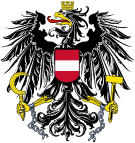Christian Party of Austria
You can help expand this article with text translated from the corresponding article in German. (October 2017) Click [show] for important translation instructions.
|
Christian Party of Austria Christliche Partei Österreichs | |
|---|---|
 | |
| Leader | Alfred Kuchar |
| Founded | 15 October 2005 |
| Ideology | |
| Political position | Centre-right to right-wing |
| Religion | Christian fundamentalism[1] |
| European affiliation | European Christian Political Movement |
| Colours | Yellow |
| Slogan | "Life. Values. Future." |
| National Council: | 0 / 183
|
| Federal Council: | 0 / 62
|
| European Parliament: | 0 / 19
|
| Website | |
| www | |
| This article is part of a series on the |
| Politics of Austria |
|---|
 |
The Christian Party of Austria (German: Christliche Partei Österreichs, CPÖ; formerly the Christians – German: Die Christen) is a minor political party in Austria, founded on 15 October 2005.[2]
It changed its name under its new chairman Rudolf Gehring in late 2009, to avoid the use of the term "Christians" to mean only the party.[citation needed]
History
[edit]The party was registered on 23 January 2006, and presented to the public on 27 September 2007, when it announced a popular initiative ("Volksbegehren") on the topic of children and families and that it would contest the 2008 election in Lower Austria.
In the 2008 parliamentary election, the party received 0.64% of the vote.
Rudolf Gehring, the party's chairman, announced he would run for president in the 2010 election. He received 5.44% of the vote for third place, the party's highest vote percentage in a national election to date.
Goals
[edit]The party is oriented mainly on Christian politics, advocating, for example:
- Revoking the recognition of same-sex unions
- Giving parents the right to vote for their children
- Maintaining Christian symbols in schools
- Outlawing (or maintaining the illegality of) abortion, euthanasia, stem cell research and artificial insemination
- Protection of the belief in a Creator God, stating that the importance of this belief "demands respect from other creeds and atheists"[citation needed] as well
- A rejection of further EU centralization
- A rejection of illegal immigration
Election results
[edit]National Council
[edit]| Election year | # of total votes | % of overall vote | # of seats | Government |
|---|---|---|---|---|
| 2008 | 31,080 | 0.64% | 0 / 183
|
Extra-parliamentary |
| 2013 | 6,647 | 0.14% | 0 / 183
|
Extra-parliamentary |
| 2017 | 425 | 0.01% | 0 / 183
|
Extra-parliamentary |
| 2019 | 260 | 0.00% | 0 / 183
|
Extra-parliamentary |

President
[edit]| Election | Candidate | First round result | Second round result | ||||
|---|---|---|---|---|---|---|---|
| Votes | % | Result | Votes | % | Result | ||
| 2010 | Rudolf Gehring | 171,668 | 5.43% | 3rd place | |||
| 2016 | No candidate | ||||||
| 2022 | No candidate | ||||||
| State | Year | Votes | % | Seats | ± | Government |
|---|---|---|---|---|---|---|
| Burgenland | 2015 | 699 | 0.38 (#7) | 0 / 36
|
N/A | Extra-parliamentary |
| Lower Austria | 2008 | 8.537 | 0.84 (#6) | 0 / 56
|
N/A | Extra-parliamentary |
| Lower Austria | 2013 | 841 | 0.09 (#8) | 0 / 56
|
N/A | Extra-parliamentary |
| Lower Austria | 2018 | 584 | 0.06 (#6) | 0 / 56
|
N/A | Extra-parliamentary |
| Salzburg | 2018 | 181 | 0.07 (#9) | 0 / 36
|
N/A | Extra-parliamentary |
| Styria | 2010 | 4.762 | 0.72 (#7) | 0 / 56
|
N/A | Extra-parliamentary |
| Tyrol | 2008 | 4.699 | 1.40 (#6) | 0 / 36
|
N/A | Extra-parliamentary |
| Upper Austria | 2009 | 3.721 | 0.43 (#7) | 0 / 56
|
N/A | Extra-parliamentary |
| Upper Austria | 2015 | 3.111 | 0.36 (#7) | 0 / 56
|
N/A | Extra-parliamentary |
| Upper Austria | 2021 | 863 | 0.11 (#9) | 0 / 56
|
N/A | Extra-parliamentary |
| Vorarlberg | 2014 | 833 | 0.49 (#7) | 0 / 36
|
N/A | Extra-parliamentary |
| Vorarlberg | 2019 | 426 | 0.26 (#11) | 0 / 36
|
N/A | Extra-parliamentary |
References
[edit]- ^ Jutta Berger (9 October 2019). "Vorarlberg vor der Wahl: Kleines Land mit großer Vielfalt". Der Standard (in German). Retrieved 5 April 2024.
- ^ Napieralski, Bartosz (2017). Political Catholicism and Euroscepticism : the deviant case of Poland in comparative perspective (1st ed.). New York. p. 168. ISBN 978-1-315-28167-4. OCLC 997475188.
{{cite book}}: CS1 maint: location missing publisher (link)
External links
[edit]- Official website
 (in German)
(in German)
- Catholic political parties
- Christian fundamentalist organizations in Europe
- Christian political parties
- Political parties established in 2005
- Conservative parties in Austria
- 2005 establishments in Austria
- Anti-LGBTQ Christian organizations
- Organizations that oppose LGBTQ rights in Europe
- Opposition to same-sex marriage in Europe
- Anti-gender movement
- Western European political party stubs
- Austria politics stubs


